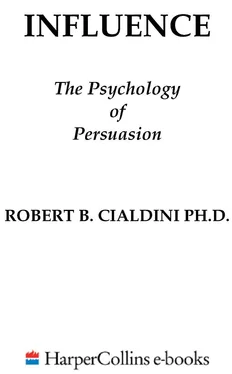It is much more profitable for salespeople to present the expensive item first, not only because to fail to do so will lose the influence of the contrast principle; to fail to do so will also cause the principle to work actively against them. Presenting an inexpensive product first and following it with an expensive one will cause the expensive item to seem even more costly as a result—hardly a desirable consequence for most sales organizations. So, just as it is possible to make the same bucket of water appear to be hotter or colder, depending on the temperature of previously presented water, it is possible to make the price of the same item seem higher or lower, depending on the price of a previously presented item.
Clever use of perceptual contrast is by no means confined to clothiers. I came across a technique that engaged the contrast principle while I was investigating, undercover, the compliance tactics of real-estate companies. To "learn the ropes," I was accompanying a company realty salesman on a weekend of showing houses to prospective home buyers.
The salesman—we can call him Phil—was to give me tips to help me through my break-in period. One thing I quickly noticed was that whenever Phil began showing a new set of customers potential buys, he would start with a couple of undesirable houses. I asked him about it, and he laughed. They were what he called "setup" properties. The company maintained a run-down house or two on its lists at inflated prices. These houses were not intended to be sold to customers but to be shown to them, so that the genuine properties in the company's inventory would benefit from the comparison. Not all the sales staff made use of the setup houses, but Phil did. He said he liked to watch his prospects' "eyes light up" when he showed the place he really wanted to sell them after they had seen the run-down houses. "The house I got them spotted for looks really great after they've first looked at a couple of dumps."
Automobile dealers use the contrast principle by waiting until the price for a new car has been negotiated before suggesting one option after another that might be added. In the wake of a fifteen-thousand-dollar deal, the hundred or so dollars required for a nicety like an FM radio seems almost trivial in comparison. The same will be true of the added expense of accessories like tinted windows, dual side-view mirrors, whitewall tires, or special trim that the salesman might suggest in sequence. The trick is to bring up the extras independently of one another, so that each small price will seem petty when compared to the already-determined much larger one. As the veteran car buyer can attest, many a budget-sized final price figure has ballooned from the addition of all those seemingly little options. While the customer stands, signed contract in hand, wondering what happened and finding no one to blame but himself, the car dealer stands smiling the knowing smile of the jujitsu master.
READER'S REPORT
From the Parent of a College Coed
Dear Mother and Dad:
Since I left for college I have been remiss in writing and I am sorry for my thoughtlessness in not having written before. I will bring you up to date now, but before you read on, please sit down. You are not to read any further unless you are sitting down, okay?
Well, then, I am getting along pretty well now. The skull fracture and the concussion I got when I jumped out the window of my dormitory when it caught on fire shortly after my arrival here is pretty well healed now. I only spent two weeks in the hospital and now I can see almost normally and only get those sick headaches once a day. Fortunately, the fire in the dormitory, and my jump, was witnessed by an attendant at the gas station near the dorm, and he was the one who called the Fire Department and the ambulance. He also visited me in the hospital and since I had nowhere to live because of the burntout dormitory, he was kind enough to invite me to share his apartment with him. It's really a basement room, but it's kind of cute. He is a very fine boy and we have fallen deeply in love and are planning to get married. We haven't got the exact date yet, but it will be before my pregnancy begins to show.
Yes, Mother and Dad, I am pregnant. I know how much you are looking forward to being grandparents and I know you will welcome the baby and give it the same love and devotion and tender care you gave me when I was a child. The reason for the delay in our marriage is that my boyfriend has a minor infection which prevents us from passing our pre-marital blood tests and I carelessly caught it from him.
Now that I have brought you up to date, I want to tell you that there was no dormitory fire, I did not have a concussion or skull fracture, I was not in the hospital, I am not pregnant, I am not engaged, I am not infected, and there is no boyfriend. However, I am getting a "D" in American History, and an "F" in Chemistry and I want you to see those marks in their proper perspective.
Your loving daughter,
Sharon
Sharon may be failing chemistry, but she gets an "A" in psychology.
Chapter 2 - RECIPROCATION
The Old Give and Take...and Take
Pay every debt, as if God wrote the bill.
—Ralph Waldo Emerson
A FEW YEARS AGO, A UNIVERSITY PROFESSOR TRIED A LITTLEexperiment. He sent Christmas cards to a sample of perfect strangers. Although he expected some reaction, the response he received was amazing—holiday cards addressed to him came pouring back from the people who had never met nor heard of him. The great majority of those who returned a card never inquired into the identity of the unknown professor. They received his holiday greeting card, click, and, whirr, they automatically sent one in return. While small in scope, this study nicely shows the action of one of the most potent of the weapons of influence around us—the rule for reciprocation. The rule says that we should try to repay, in kind, what another person has provided us. If a woman does us a favor, we should do her one in return; if a man sends us a birthday present, we should remember his birthday with a gift of our own; if a couple invites us to a party, we should be sure to invite them to one of ours. By virtue of the reciprocity rule, then, we are obligated to the future repayment of favors, gifts, invitations, and the like. So typical is it for indebtedness to accompany the receipt of such things that a term like "much obliged" has become a synonym for "thank you," not only in the English language but in others as well.
The impressive aspect of the rule for reciprocation and the sense of obligation that goes with it is its pervasiveness in human culture. It is so widespread that after intensive study, sociologists such as Alvin Gouldner can report that there is no human society that does not subscribe to the rule. And within each society it seems pervasive also; it permeates exchanges of every kind. Indeed, it may well be that a developed system of indebtedness flowing from the rule for reciprocation is a unique property of human culture. The noted archaeologist Richard Leakey ascribes the essence of what makes us human to the reciprocity system: "We are human because our ancestors learned to share their food and their skills in an honored network of obligation," he says. Cultural anthropologists Lionel Tiger and Robin Fox view this "web of indebtedness" as a unique adaptive mechanism of human beings, allowing for the division of labor, the exchange of diverse forms of goods, the exchange of different services (making it possible for experts to develop), and the creation of a cluster of interdependencies that bind individuals together into highly efficient units. 4
Читать дальше












